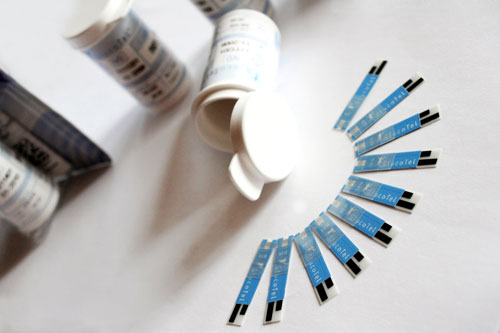It is a must for every diabetic to take their daily medicine for diabetes. Not doing so can lead to dangerous side effects. There are two extremely critical situations that diabetics must never be in: hyperglycemia and hypoglycemia. When a diabetic experiences either of these conditions, it can be quite dangerous and even potentially fatal.
Hypoglycemia
Have you been missing your meals lately? Did you feel lightheaded or tired afterwards? What you may have experience is called hypoglycemia, which is a potentially fatal condition when left unnoticed.
Hypoglycemia occurs when a diabetic does not have enough sugar, also known as glucose, in their system. Persons with type 1 diabetes are more susceptible to hypoglycemia than persons with type 2 diabetes due to the fact that they take insulin.
Symptoms of Hypoglycemia are rapid heartbeat (palpitations), pale skin, headaches, shaking, difficulty focusing, nausea, blurry vision, sudden fatigue, mood swings and blood sugar levels below 70 mg/dL. Always have something sweet, like hard candy or a small packet of sugar, with you at all times to control a hypoglycemic attack when it occurs. If nothing happens after 10-15 minutes, take another dose. If there is no improvement after the third dosage, go to the nearest hospital immediately.
If the symptoms are ignored, serious complications may occur. These are severe disorientation, loss of consciousness and seizures which may eventually lead to a diabetic coma or even death. Such was the case of Anne Rice These complications may lead to the discovery of a person of his or her diabetes. Such was the case of famous author, Anne Rice, who only discovered she had Type 1 diabetes after falling into a diabetes coma in 1998. Severe symptoms of hypoglycemia will require the help of another person to manage or control the symptoms. This person should immediately contact a medical professional and either bring you to the hospital or call for an ambulance.
There are many ways to avoid hypoglycemia, one of which is to avoid alcohol as this can cause your blood sugar levels to fall drastically. Another would be eating your meals on time. Remember, one of the causes of hypoglycemia is a missed meal therefore no matter how busy you are, give yourself a ten minute break and eat.

Hyperglycemia
Have you been eating a lot more sugar rich foods than usual? Have you been going to the restroom and along with it, fatigue and nausea afterwards? You may be experiencing hyperglycemia.
Hyperglycemia is when a diabetic has too much sugar in their system, which leads to high blood sugar levels. Type 2 diabetics are more prone to hyperglycemia due to their diet.
Symptoms of hyperglycemia are frequent urination, increased hunger, heightened thirst, nausea, sudden weight loss, and blood sugar level above 180 mg/dL. If you suspect that you have hyperglycemia, consult a doctor to know what medication you must take to control it. Unlike hypoglycemia, hyperglycemia is gradual and can take a few days to develop, thus giving you ample time to remedy it.
To prevent hyperglycemia, avoid overeating, always exercise, drink water, take your prescribed medicines on time, and fix your diet. If your blood sugar levels are higher than 240 mg/dL, do not exercise and lower it down using other methods for the meantime.
Complications due to hyperglycemia include nerve damage, kidney damage, cardiovascular complication and eye problems. If your blood sugar is too high you may need a visit to the emergency room for an urgent remedy before you faint or fall into diabetic coma.
Always wear your diabetic identification and carry a glucometer with you. As a diabetic, it is an absolute must for you to be able to monitor your blood sugar anytime and anywhere. Yes, it can be a bit bulky and at first tedious but better safe than never, right?